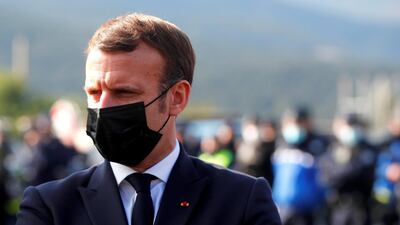Emmanuel Macron drew a link between terrorism and organised crime on Thursday as he called for an overhaul of Europe-wide border regimes to strengthen defences against a new wave of ISIS attacks.
Visiting a frontier border control centre, Mr Macron said the Schengen system in Europe needed in-depth reform to address the security challenges from extremist groups. He said the number of border officials would be doubled to almost 5,000.
"The recent attacks require Europe to intensify our struggle," Mr Macron said. Illegal immigration and trafficking networks are "more and more often, are linked to terrorist networks,” he said.
The French President earlier declared his country a “breeding ground for terrorism” where radical views were being taught to children as young as three by radicalised ideologues. “Groups linked to radical Islam are teaching hatred of the republic to our children, calling on them to disregard its laws. That is what I called 'separatism' in one of my speeches,” he said.
The President said his country was taking a stand against fanaticism and violent extremism within its own society. This is not the same, he emphasised, as taking a stance against a religion.
In a letter to the Financial Times, Mr Macon noted France had faced a "wave of attacks perpetrated by terrorists in the name of an Islam that they have distorted" since 2015, with 263 people murdered, mostly by extremists with links to ISIS. Last month Samuel Paty, a history and geography teacher, was decapitated outside his school near Paris and last week three people were assassinated in a church in Nice.
The perpetrator of the Nice attack is believed to have travelled from Tunisia through Lampedusa in Italy and on to the southern French city.
The wave of attacks has prompted Mr Macron to take a wide-ranging view on the role of extremists, something that triggered condemnation from several countries and a call to boycott French goods.
He rebuffed the accusations that he harboured or promoted prejudice. “I will not allow anybody to claim that France, or its government, is fostering racism against Muslims,” he wrote.
He said that France was a secular country and the state never interfered in religious affairs. “Our law enforcement forces protect mosques, churches and synagogues alike,” he said. “This is what France is fighting against, designs of hatred and death that threaten its children, never against Islam.”
He made the point that France, and by extension many other countries, had benefited from Islam. “France is a country that knows what it owes to the Islamic civilisation: its mathematics, its science, its architecture all borrow from it."
His views were echoed by Manuel Valls, the former French prime minister, who said the current conflict in France was a “battle of civilisations, not a war between civilisations”.
In a roundtable debate with the respected UK think tank, Policy Exchange, he said: “Terrorism, Islamism is conducting a war against a civilisation and we have to really fight that on behalf of our civilisation ... there’s an incredible battle to be fought and we need Muslims. It’s very important to say that, Muslims are protected by the [French] Republic against Islamists and this talk about provocation, it doesn’t stand up.”


